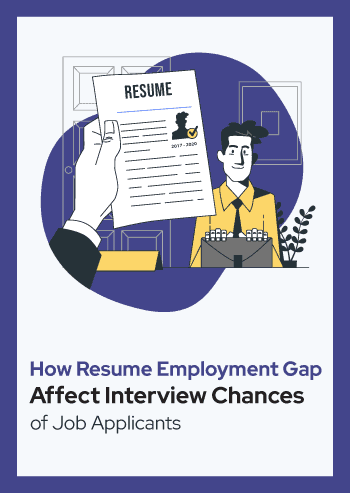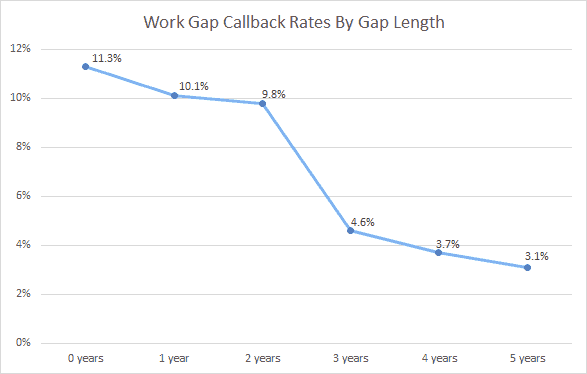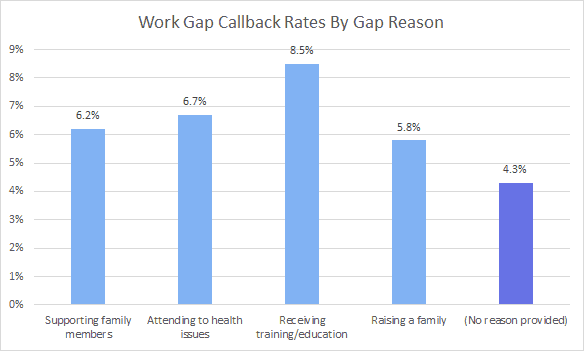How Resume Employment Gaps Affect Interview Chances of Job Applicants
Applicants with work gaps have a 45% lower chance of receiving job interviews

Applicants with work gaps have a 45% lower chance of receiving job interviews
There has always been a negative stigma associated with employment gaps. Those with gaps in their work history run the risk of being seen as lazy or unfocused with their careers, and not as an in-demand asset in the eyes of potential employers. However, while the stigma associated with employment gaps is well-known, precisely how these gaps empirically affect the hiring chances of job applicants is not, with little to no research done on the matter. To learn more about how employers react to employment gaps and their impact on an applicant’s interview chances, ResumeGo conducted a field experiment from January 14, 2019 to July 5, 2019 in which 36,510 job openings from across popular job boards were applied to using fictitious applicants. The field experiment focused on examining two factors that may largely influence the significance of work gaps:- Being unemployed for one year is very different from being unemployed for 4 years. How does the duration of an applicant’s work gap affect their interview chances and overall hirability?
- People take time off from work for different reasons, whether it is because of personal health issues or whether it is to raise a family. Is disclosing the exact reason for having a work gap beneficial towards an applicant’s chances of getting a job?
Interview chances significantly decreased for applicants with work gaps of 3 or more years

Applicants who provided a reason for their work gap received close to 60% more interviews

Methodology
Creating Resumes Resumes used in the field experiment were created based on those of actual job seekers, with slight modifications made to the names, locations, dates, etc… in order to hide each applicant’s identity, but still fulfill the purpose of the study. Explaining reason for work gap To make the reason for the applicant’s work gap as clear as possible to hiring managers, both the resumes and cover letters submitted include a section that clearly explains the reason for the applicant’s work gap. The majority of resumes were written with objective statements at the top where this was included. The only resumes for which this was not the case were the ones belonging to applicants who purposely chose not to disclose the reason for their work gap. A portion of each cover letter submitted was also dedicated towards relaying this same message to make sure hiring managers did not miss it. The reasons for every applicant’s work gap were grouped into one of five categories: 1. Caring for sick family members 2. Attending to personal health issues 3. Receiving additional training/education 4. Raising a family 5. Providing no reason Setting duration of work gaps The duration of every applicant’s work gap was grouped into one of six categories: no work gap, 1-year work gap, 2-year work gap, 3-year work gap, 4-year work gap, and 5-year work gap.- A 1-year work gap was considered any work gap with a duration between 9 months and 15 months.
- A 2-year work gap was considered any work gap with a duration between 1 year 9 months and 2 years 3 months.
- A 3-year work gap was considered any work gap with a duration between 2 years 9 months and 3 years 3 months.
- A 4-year work gap was considered any work gap with a duration between 3 years 9 months and 4 years 3 months.
- A 5-year work gap was considered any work gap with a duration between 4 years 9 months and 5 years 3 months.
- Having no work gap at all was considered any work gap with a duration between 0 and 3 months.
Final Thoughts
While the field experiment conducted only analyzes the interview chances of applicants, and does not examine whether applicants were ultimately given a job offer and at what compensation levels, the results clearly show a strong negative correlation between the length of employment gaps and interview callback rates – which was expected. More surprisingly, the findings of the study suggest that once job seekers have been unemployed for over 2 years, their value in the eyes of hiring employers falls sharply, as evidenced by a significant drop in callback rates from a 2-year work gap to a 3-year work gap. Professionals who have been out of the workforce but are looking to avoid this potential hit to their interview chances should position themselves to find a job before that time. Furthermore, the findings heavily suggest that job seekers with a legitimate reason for their work gap could benefit from disclosing this reason to hiring managers through their resume and cover letter. Work gaps are usually looked down upon by employers because they can mean that applicants are lazy and not prioritizing their careers. By providing a valid excuse for having a work gap, applicants may deter employers from assuming the worst. While having employment gaps is oftentimes unavoidable, job seekers who are made aware of these findings will not only be more informed of the potential impact, but also gain valuable insight into how to overcome an employment gap.45% less likely
to receive job interviewssignificantly decreased
for work gaps of 3 or more yearsclose to 60%
more interviewsAre you a hiring professional? Share your expertise!
More surveys are to come and the more insight the better. We’re welcoming recruiters and hiring professionals to shed light on their hiring habits and preferences.


See other resume research we’ve done.
Data is used for everything, so why not for resume writing? See more surveys and field experiments we’ve conducted over the years that have influenced the way resumes and other job documents are written.
More resources for your resume and job search
Whether you’re a career expert or a total beginner, there’s always more to learn. Use these resources to level up your resume and build your career.


